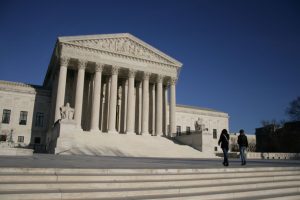- Slug: BC-CNS-SCOTUS Tribal Health. 425 words.
- File photo available.
By Brianna Chappie
Cronkite News
WASHINGTON – The U.S. Supreme Court ruled Thursday that the federal government must pay millions in administrative and overhead costs for federal health care programs that Native American tribes had taken over.
The Indian Self-Determination and Education Assistance Act authorizes Indian tribes and Tribal Organizations to contract for the administration and operation of certain federal programs, such as those run by the Indian Health Service, an agency in the Department of Health and Human Services.
But the San Carlos Apache in Arizona and the Northern Arapaho in Wyoming say they were left spending millions of dollars related to insurance billing. The tribes sued for breach of contract under the 1975 law.
HHS argued that it isn’t responsible for such fees, estimating the cost to federal taxpayers could reach $800 million to $2 billion a year for all tribes.
The Supreme Court ruled 5-4 in favor of the tribes.
Withholding reimbursement would be the same as assessing “a penalty for pursuing self-determination,” Chief Justice John Roberts wrote in the ruling. “If IHS does not cover costs to support a tribe’s expenditure of program income, the tribe would have to divert some program income to pay such costs, or it would have to pay them out of its own pocket.”
Billing cost the San Carlos Apache nearly $3 million over three years and the Northern Arapaho tribe $1.5 million over two years, according to the tribes. Two federal appeals courts had sided with the tribes before the case reached the Supreme Court.
Xavier Becerra, the secretary of Health and Human Services, issued a statement saying his department supports “tribal self-determination and sovereignty” but will need more funding from Congress to cover costs associated with the ruling.
Justice Brett Kavanaugh, in a dissenting opinion joined by Justices Clarence Thomas, Samuel Alito and Amy Coney Barrett, wrote that “the extra federal money that the Court today green-lights does not come free.”
“The court should leave those difficult appropriations decisions and tradeoffs to Congress,” he wrote.
Congress created self-determination contracts in 1975 to allow for more self-government on reservations.
According to the Department of the Interior, tribes have more than 3,200 such contracts.
In a statement on social media, the Northern Arapaho called the ruling “a momentous victory for the Northern Arapaho people and the sovereignty of all tribes.” The statement says that Congress intended for tribes to be reimbursed for administering health care programs, and an adverse ruling “would have cost our Tribe alone millions of dollars, leading to reduced services and programs that our community relies upon.”
For more stories from Cronkite News, visit cronkitenews.azpbs.org.
